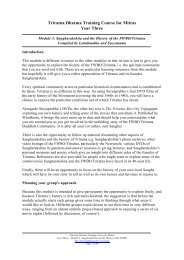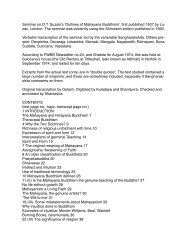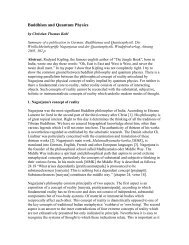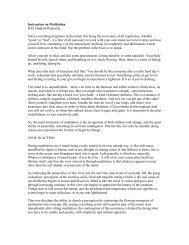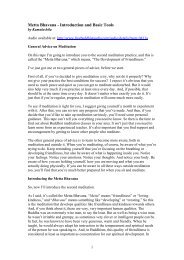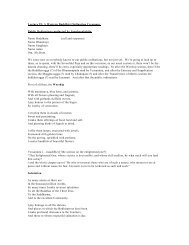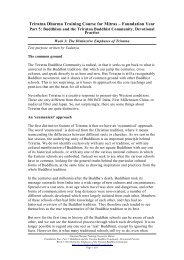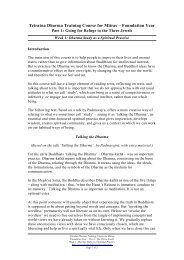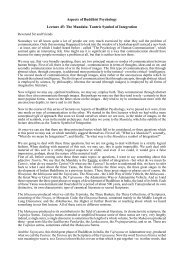The Drama of Cosmic Enlightenment, White Lotus Sutra
The Drama of Cosmic Enlightenment, White Lotus Sutra
The Drama of Cosmic Enlightenment, White Lotus Sutra
Create successful ePaper yourself
Turn your PDF publications into a flip-book with our unique Google optimized e-Paper software.
live in, but usually without knowing it. But it is not a question <strong>of</strong> leaving the realm<br />
<strong>of</strong> historical reality behind; we exist in them both all the time, whether we are<br />
aware <strong>of</strong> it, or not. It‘s analogous to the way we experience our waking and dream<br />
lives. If we are to give a complete account <strong>of</strong> ourselves, we must describe not only<br />
our waking life but also our dream life; and significantly, most <strong>of</strong> us find this very<br />
difficult to do. All too <strong>of</strong>ten whereas the two seem discontinuous, occupying<br />
different planes, it is possible to be aware in such a way <strong>of</strong> the continuity <strong>of</strong> the<br />
relation between the two.<br />
When we say the <strong>Lotus</strong> Sūtra is a myth, what do we mean? A myth emerges, not<br />
out <strong>of</strong> thin air, but out <strong>of</strong> spiritual necessity. It comes into being when people have<br />
very strong feelings and pr<strong>of</strong>ound aspirations about what goes beyond personal<br />
situations that need to be projected into an, as it were, objective form. By myth, in<br />
this sense, we do not mean something false, untrue or mere fantasy. On the<br />
contrary, a myth points to something deeply true, an expression, through image<br />
and story, <strong>of</strong> truths beyond the direct grasp <strong>of</strong> our intellect. It is like a diamond: its<br />
beauty is fully revealed when worked on by a master jeweller, its facets sparkling<br />
with reflected light and iridescent colour. In this way we come to understand that<br />
meaning is not a thing that we grasp by looking in a dictionary. Meaning is<br />
meaning for each <strong>of</strong> us, something we personally experience. Our thirst for<br />
meaning is therefore our search for our self, our quest for totality, the wholeness<br />
<strong>of</strong> our own being, that lives partly, if not essentially, in a realm, not <strong>of</strong> clearly<br />
defined meanings, but <strong>of</strong> undefined, even undefinable meanings.<br />
Notwithstanding the huge popularity <strong>of</strong> the <strong>Lotus</strong> Sūtra, sometimes people find it<br />
difficult to engage with. While it may appear to be set in what we think <strong>of</strong> as our<br />
normal world, being a Mahāyāna Sūtra it is essentially free from the contingent,<br />
the determinate, from time, space and causality, from historical reality. So it is not<br />
to be taken literally. As has already been said, to get the most from our encounter<br />
with the Sūtra, it‘s important to set out to enjoy and immerse ourselves in it in the<br />
way we might a good novel, play or poetry; to allow ourselves to be captivated by<br />
its atmosphere and magic – this being more an openness to feeling and emotional<br />
resonance than intellectual understanding and analysis. It is true that we may well<br />
feel more at home with Western literature that deals <strong>of</strong>ten with ordinary human<br />
predicaments with which we can easily identify. But human frailty is not the only<br />
possible subject for literature; it is not always the most inspiring and uplifting. <strong>The</strong><br />
Sūtra takes us away from ordinary human life and its problems to give us a taste <strong>of</strong><br />
the magical. If we read the Sūtra as literature rather than dogma, as poetry rather<br />
than scientific fact or philosophical truth, we may perhaps be more open to its<br />
spiritual message.<br />
In reading the <strong>Lotus</strong> Sūtra as literature, hard work as it may be at times, we engage<br />
with it for its own sake rather than for some ulterior purpose, not because we have<br />
to, perhaps out <strong>of</strong> some sense <strong>of</strong> an external authority telling us we should, or a<br />
sense <strong>of</strong> fundamentalism that this is ‗<strong>The</strong> Word‘, but because we have a natural<br />
Triratna Dharma Training Course for Mitras<br />
Year Four – Module 4: <strong>The</strong> <strong>Drama</strong> <strong>of</strong> <strong>Cosmic</strong> <strong>Enlightenment</strong><br />
Parables, Myths and Symbols <strong>of</strong> the Saddharma-puṇḍarīka Sūtra<br />
http://freebuddhistaudio.com/study<br />
Page 6 <strong>of</strong> 150



